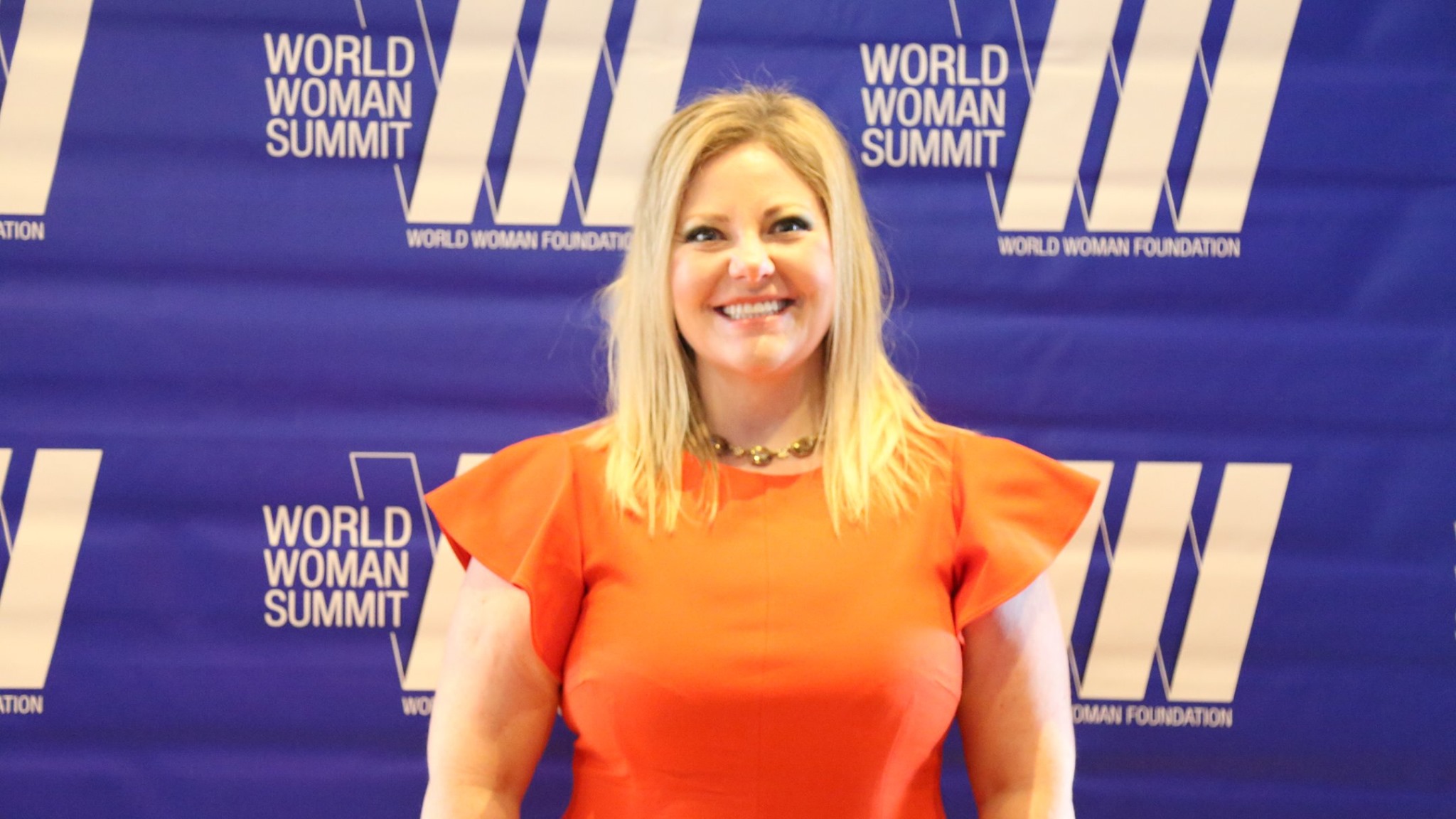World Woman Hour honors Michelle McMurry-Heath for her leadership in the life sciences and for promoting women’s roles in those sciences. Michelle is President and CEO of the Biotechnology Innovation Organization (BIO). The group is a coalition of about 1,000 biotech companies and research centers, active in areas such as health care, agriculture, and environmental science. Under Michelle’s guidance, BIO advocates for public policies that support science, and also create alliances and events for purposes like knowledge-sharing. (One alliance helped to accelerate the development of Covid-19 vaccines.)
Michelle’s background makes her a powerful leader. As a student, she was the first African American to graduate from Duke University’s renowned MD/Ph.D. program for training medical scientists. After working as a hands-on researcher, she played key roles in various U.S. government initiatives. These included planning how to protect the country from bioterror attacks, and efforts to improve the processes for testing and distributing new medicines. Here are highlights from Michelle’s interview with World Woman Hour.

Q: Could you tell us how your early life and career shaped the journey to where you are now?
Michelle McMurry-Heath: Both of my parents were in public health, so I got to see how there was such a need to apply what we know about health care to communities of people who were really struggling—struggling to make it every day, struggling to improve their lives and the lives of their children. As I got more exposed to science and the power of not just what we know today, but what we’re going to know in the future, I saw that it was important to make sure that those future advances are within reach of more families.
So I decided that I wanted to combine medicine and science with public policy. That led me to a series of roles which included working on Capitol Hill and working for the Food and Drug Administration. And, eventually, I was tapped to lead the Biotechnology Innovation Organization.
Q: Clearly you have a passion for the social mission of science. Would you say more about that?
Michelle: We often tend to think of science as something precious or privileged, that will only apply to or help the most advantaged among us. But actually, I think science is ten times, if not hundreds of times more important for those of us who are disadvantaged because it is so powerful. Science has the ability to unlock health, to unlock clean environments. It has the ability to deliver nutritious foods that are fundamental to building healthy minds and bodies in children all over the globe. In these ways and more, science is the great equalizer.
So we have to make sure that new scientific knowledge and new technologies are disseminated to absolutely everyone who needs them. For example, helping our innovative companies bring their Covid vaccines to market has been an incredible experience. I remember getting my own vaccination and looking at the lines and lines of people just waiting to get their share of that science.
This illustrates why it’s important for scientists to realize that science has the power to change so many lives and to fight for access to scientific knowledge. I think that’s as important as pursuing knowledge in the first place. And as I meet young scientists today, I think a lot of them are enthused by the idea that science can be something that delivers justice and delivers hope.
Q: People always want to know how leading women deal with challenges and setbacks. Can you share what you’ve learned?
Michelle: I think the biggest stymieing points in my career have been the times when I want to do something that is at the junction of two different areas, and there’s no map for those junctions, no map for those new territories. There’s always that point where you have to decide: Are you going to have faith in yourself and the courage to pursue what is really igniting your imagination? Or are you going to stick to the known maps? I encourage everyone to follow those insights, those fascinations that make you uniquely intrigued and suited for pursuing a question.
Q: Can you give examples of these cutting-edge “junctions”?
Michelle: Science right now is about bringing down barriers between disciplines. You have bioinformatics, where you’re combining your knowledge of biology with your knowledge of information technology. You have big data, where you’re thinking about how artificial intelligence can help you answer a critical question of human health. I think the future is about those junctures, those blurring of boundaries. That’s where the real knowledge gains can be made. And I would hazard to say that many female scientists are uniquely suited to some of that frontier-hunting, which is so critical for science.
Q: What changes could be made in your field for women to lead more effectively?
Michelle: I think women are incredible leaders. I think we’re really good, on the whole, at being able to balance competing priorities and pay attention to the myriad needs of people around us. We’re able to be responsive and responsible at the same time, so I don’t think there needs to be a change to let women be effective leaders. I think there needs to be a recognition that leadership is most effective when it is not only focused on concrete results.
Concrete results are extremely important, and I think female leaders are great at getting to those results. But they’re also good at building the fabric of an organization, which lets you deliver those concrete results over a much longer range of time. Sometimes there’s a scorched-earth approach to leadership, where you drive to the immediate result in such a way that you win the battle and lose the war, because you destroy everything in your wake to get there.
I think many of us who are female leaders see ourselves as building for the future, not just building for that short-term deliverable. And I think that’s a view of longevity of leadership that can be more valued than it is today.
Q: What do you see as the most pressing issues for increasing the representation of women in science and innovation?
Michelle: Well, it’s improving. If you look at graduate schools and sometimes at the more junior professional levels, we’re almost reaching parity if not greater than parity of women in a number of the scientific fields. But women tend to lose that parity and fall ‘way behind as you go up the ladder.
When I was in graduate school, 20-30 years ago, there were a lot of female participants in the sciences. But as you look around today, you don’t see them in the same percentage of representation in leadership. There’s been some attrition, and I think if we don’t pay more careful attention to what’s causing that attrition, we’ll be sitting here 20 years from now wondering how we got so far behind in terms of pulling female leaders into science.
One thing that I think stands in the way of women as they go along through their scientific careers is just the trajectory of the career; the timing of the career that you are expected to have. The timeframe in which you’re supposed to make certain types of investments in your future doesn’t necessarily line up with having and raising a family. I think there needs to be a little more elasticity in scientific career trajectories so that more women can have that window of time to have a family, as well as continue to progress. So career flexibility is going to be important.
I think we also need to ask ourselves, are we paying enough attention to the questions that women want to answer? It has struck me throughout my career that people are attracted to answering the scientific problems that strike a chord with them individually, and there is nothing wrong with that. It leads to great passion and devotion to pursuing the answer, which is exactly what you want. But then we have to have a broad acceptance of the types of questions that we think are worth pursuing, if we want a broad representation of female scientists in the field.
Q: Are there major scientific questions or research areas that need to be pursued more vigorously?
Michelle: Women’s health and reproductive health are areas that have been woefully neglected for decades. And I think that’s due in part to a judgment that these areas are not as important for research as other areas of human health, which we all know is nonsense. We don’t have human health without reproductive health. We don’t have healthy families without healthy women. So we need to make sure that we’re valuing these areas of research as we go along.
Q: Any advice you would give to your younger self, which might also apply to young women today?
Michelle: Mentors are critical but not sufficient. Particularly when we’re starting out, it’s such good advice to find mentors who can shed light on what lies ahead. You want to make sure that you understand the path you’re considering and that someone is there to help steer you. But at the same time, when you’re charting a new course, sometimes it’s difficult if not impossible to find a mentor who really knows that novel terrain. So you have to use that mentorship, soak it up and be grateful for it, but at the same time not be constrained by it. I think that’s critical as you explore what excites you individually.


















